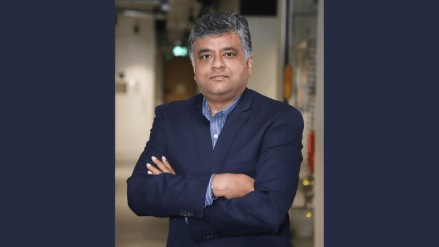It’s been almost a year since WPP’s media investment group GroupM launched its largest agency EssenceMediacom, merging Essence and Mediacom. The merged entity is already No 3 in the pecking order, adding nearly Rs 800 crore in new businesses in the last one year. In this interview, Navin Khemka, CEO, South Asia, tells Alokananda Chakraborty how media effectiveness parameters have evolved over the years and what advertising networks must do to navigate the AI revolution. Edited excerpts:
What has been the biggest benefit of the Essence-Mediacom merger?
In India, the merger gave us scale and put us in the top 3. India is one of the very few markets globally in which all the GroupM agencies are among the top 3 agencies in their categories. Two things about any merger are very critical — retaining top talent and clients because there is a lot of uncertainty around. We have been able to manage both smoothly. In the last year alone, we have logged nearly `800 crore in new businesses.
Let’s look at media effectiveness. Reports say till about 5 years ago, 65% of advertising effectiveness was about the message and 35% was about placement. It seems the industry is headed towards a situation where the onus lies on placement. Do you agree?
I say it is always platform first. I won’t say the situation has flipped completely, it could still be 50-50 but things like placement and targeting are definitely growing in importance. Honestly, the 30-second TVC really does not excite us at all. That is important in a launch campaign but from an audience point of view, from a media point of view or from the platform point of view, there’s so much more that can be done today. Take Bigg Boss Bigg Benefit for example. For the first time ever, the Bigg Boss house was available to be booked for a homestay experience. That created a huge amount of social chatter for MakeMyTrip. It just shows you the power of an idea and the power of contextual targeting.
Would you say the advent of artificial intelligence is also helping ideas travel that extra mile. On the flip side, AI is also making certain roles redundant….
It’s too early to say. AI is undeniably impacting the area of storytelling, personalisation, media optimisation, and targeted outreach and analysis. Already a lot of operational work is being done through AI. It is simplifying process, it is also unlocking new opportunities. I think it is critical for agencies to adapt themselves to enable this progression of AI. To that end, we are prioritising upskilling of our people. We have this WPP Open AI platform, an initiative designed to hone marketing strategies using AI tools.
But data also shows that ad agencies aren’t 100% ready for AI because they have historically relied on manual processes with data siloed in different departments…
I think everybody wants to experiment, and only when they experiment will they understand whether this is working for them or not. And everybody knows that AI is a reality that they have to adapt to. So unless you experiment, you will not be able to adapt.
For instance, we’ve developed a GenAI platform, the EM Sidekick. It’s based on the Chat GPT 4.0 technology. It has a host of tools that help boost our people’s creativity, their willingness to learn, productivity and capability. I’m seeing a lot of uptake from these young people within our offices who are using the platform and are able to free up some of their time and use that time in more productive exercises. This is a closed-door AI within our ecosystem, and we’ve done that because we deal with a lot of confidential data and client information that must stay within the system under all circumstances.
Which are those specific areas where AI can bring about the biggest changes in your industry?
First, in media operations, where a lot of manual work is being done today because we are managing millions of impressions, TV spots. I think AI can really help with that. AI can also help a lot in creative personalisation, in terms of using dynamic creative options depending on the target audience. There is one more area, which is very close to my heart, which is video optimisation. Today, every client is looking for the best media optimised plan, and what better than relevant AI tools to be able to do that, rather than relying on human intervention to try and decipher what could be going on.
Where does EssenceMediacom’s Breakthrough Accelerator group fit in in all this?
It is really a global vision. In the last three-four years post Covid, the media and entertainment sector has seen many corrections. The days of the easy VC money and mega launches are over. What is happening is that a lot of hard questions are being asked about marketing’s impact on business, about long-term versus short-term performance, about managing larger portfolios and so on. Today media agencies are expected to operate as quasi-consultants, given the tremendous pressure on the marketing community/brand managers to not just show growth but profitable growth. We rolled out Breakthrough Accelerator in India about six months back and the uptake has been quite good.
Finally, where does India fit in your global scheme of things?
When my global CEO Nick Lawson was asked how important is India for you, he gave a very interesting answer: “India is obviously not my largest market, but possibly one of my strongest markets.” That says it all. Just to drive home the point, two of EssenceMediaCom offices in India are ranked among the Top 10 offices globally — the Mumbai and the Gurgaon office.
